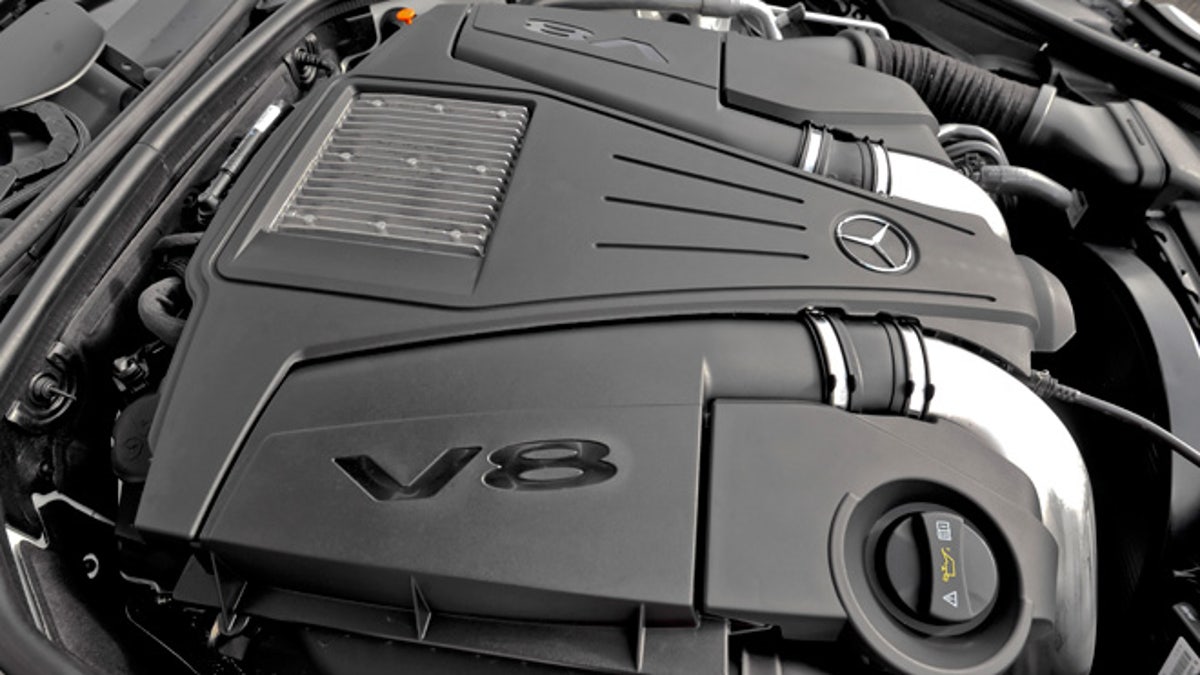
V8 engine in Mercedes-Benz SL550 (Mercedes-Benz)
It’s a “green” gas that's meant to keep cars and the planet cool, but could it heat things up instead?
Mercedes-Benz announced a recall this week after it found that a refrigerant used in the air conditioning system of its latest SL sports car could potentially catch fire. Experts say this is a bump on the road to more environmentally-friendly cars, but others wonder if the fits and starts of eco-driving are creating a new automotive nightmare.
While testing a version of the SL not sold in the United States, Mercedes discovered that the R-1234yf refrigerant could ignite if the lines that carry it rupture in an accident and the gas is released into the engine compartment. The only other automaker currently using this refrigerant in the U.S. is Cadillac in its new ATS and XTS sedans, but more automakers plan to start introduce it soon.
“We are trying to learn more about the Daimler test experience and will, of course, make any decisions and take any actions with our customers' safety in mind," said General Motors in a public statement.
The Mercedes-Benz recall appears to be overly cautious, since the warning only relates to the refrigerant catching fire in a serious crash, and there are no known reports of this happening in the real world.
According to Ed Kim, an analyst with Auto Pacific, the R-1234yf refrigerant is good for the environment because it has a "global warning potential" much lower than the one it replaces, R-134a. An additional advantage to automakers is that switching to the new refrigerant does not require much reengineering of an AC system, he says.
Just about every automaker has plans to use the new chemical in upcoming vehicles, says John O'Dell from Edmunds.com. The benefit is that R-1234yf dissipates in the atmosphere much faster – 11 days instead of 13 years.
“In the U.S., automakers will get extra credit toward meeting their CAFE [Corporate Average Fuel Economy] goals for using AC systems with R-1234yf,” O'Dell says.
The R-1234yf refrigerant is 25,000 times less flammable than gasoline, according to the patent-holder Honeywell. There are many more flammable liquids found in a modern car. But while the Mercedes and Cadillac models already underwent testing with R-1234yf before hitting the market, the recall does involve additional tests. O’Dell says every new green tech is extensively tested, but eventually has to debut.
“Today's vehicles are absolutely chock full of green technology that is making them better performing and more environmentally compatible than ever,” says Kim. “Hybrids have been around for years with no problems, and technologies like multi-speed and CVT transmissions, direct injection, turbocharging, auto engine start/stop, and weight savings are all very successful implementations of green technology.”
Kim says the problem is not green tech, but automotive innovation in general. Some new ideas turn out to be duds. But the risk of trying something new pales in comparison to the eco-benefits.
“I can think of myriad other new technologies that had nothing to do with green tech that were fraught with problems. I definitely don't see this as a word of warning for green technology. By and large, green technology implementation in automobiles has been tremendously successful,” he says.
Another expert on green technology disagrees, however. Ozzie Zehner, a visiting scholar at the University of California - Berkeley and author of the book Green Illusions, told FoxNews.com that the automotive industry is not making dramatic headway in solving serious environmental problems.
“Car companies are struggling to make green tech work because there's no such thing as a green car - at least not outside the bubble of green marketing hype,” he says, explaining that electric vehicles use more potentially polluting rare earth materials, especially lithium found in batteries, than gas-powered cars. What seems like an innovative green tech feature, he says, may be an eco-fetish that causes more damage than good.